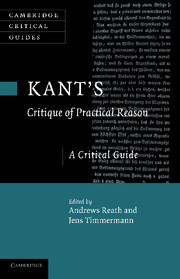Book contents
- Frontmatter
- Contents
- Preface
- List of contributors
- Translations and abbreviations
- Introduction
- 1 The origin and aim of Kant's Critique of Practical Reason
- 2 Formal principles and the form of a law
- 3 Moral consciousness and the ‘fact of reason’
- 4 Reversal or retreat? Kant's deductions of freedom and morality
- 5 The Triebfeder of pure practical reason
- 6 Two conceptions of compatibilism in the Critical Elucidation
- 7 The Antinomy of Practical Reason: reason, the unconditioned and the highest good
- 8 The primacy of practical reason and the idea of a practical postulate
- 9 The meaning of the Critique of Practical Reason for moral beings: the Doctrine of Method of Pure Practical Reason
- Bibliography
- Index
2 - Formal principles and the form of a law
Published online by Cambridge University Press: 06 August 2010
- Frontmatter
- Contents
- Preface
- List of contributors
- Translations and abbreviations
- Introduction
- 1 The origin and aim of Kant's Critique of Practical Reason
- 2 Formal principles and the form of a law
- 3 Moral consciousness and the ‘fact of reason’
- 4 Reversal or retreat? Kant's deductions of freedom and morality
- 5 The Triebfeder of pure practical reason
- 6 Two conceptions of compatibilism in the Critical Elucidation
- 7 The Antinomy of Practical Reason: reason, the unconditioned and the highest good
- 8 The primacy of practical reason and the idea of a practical postulate
- 9 The meaning of the Critique of Practical Reason for moral beings: the Doctrine of Method of Pure Practical Reason
- Bibliography
- Index
Summary
INTRODUCTION
One aim of the Critique of Practical Reason is to establish that reason alone can determine the will. To show that it can, it suffices to show that there are practical principles given by reason alone – what Kant terms ‘practical laws’, or (roughly) requirements of reason on action. Chapter I of the Analytic accomplishes this aim by arguing that the moral law is an authoritative practical principle given as a ‘fact of reason’. The chapter begins in section 1 with a ‘Definition’ (Erklärung) of a practical law as a practical principle that holds necessarily for every rational being (as a principle that ‘determines the will simply as will’ without presupposing any subjective or rationally contingent interests). From this definition Kant uses conceptual arguments to derive three ‘Theorems’ and various ‘Corollaries’ that state conditions that any practical law must satisfy. The principal condition, stated in Theorem III, is that a practical law determines choice through its form – through ‘the mere form of giving universal law’ – rather than through its matter (CpV 5:27). The arguments culminate in section 7 with the statement of the ‘Fundamental Law of Pure Practical Reason’, which Kant identifies with the moral law: ‘So act that the maxim of your will could at the same time always hold as a principle in a giving of universal law’ (CpV 5:30).
- Type
- Chapter
- Information
- Kant's 'Critique of Practical Reason'A Critical Guide, pp. 31 - 54Publisher: Cambridge University PressPrint publication year: 2010
- 22
- Cited by

